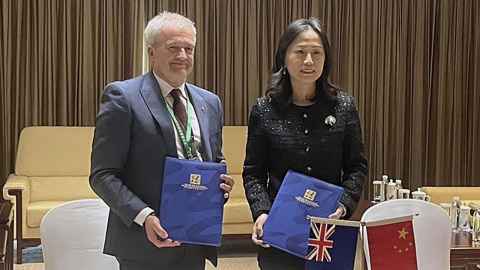Impact of AI on Chinese language education: focus of new centre
13 June 2024
Centre for Advanced Research in Chinese Language Education launched to explore the many strands of Chinese language teaching.

Even as New Zealand’s reliance on China as its chief trading nation grows, each year fewer students take the opportunity to learn about the language and culture at university level.
For a country that needs to understand China to build trusted relationships, the growing lack of New Zealanders with the skills to understand the language and culture is shaping up as a challenge.
A new research centre, the Auckland Centre for Advanced Research in Chinese Language Education, has been launched to explore the many strands of Chinese language teaching, led by Dr Danping Wang, a senior lecturer in Asian Studies in the Faculty of Arts at Waipapa Taumata Rau, University of Auckland.
Enrolment across all language programmes at university level in New Zealand has been in decline. Dr Wang’s research indicates that there has been a drop in enrolments by about 40 percent for all languages between 2010 and 2020 and for Chinese, 57 percent over the same period.
This is a dramatic change from the strong surge in Chinese language learning in the first years of the 2000s. At the University of Auckland, the language programme is weathering the change, but there is concern that given the low number of students without Chinese heritage pursuing a degree in China studies, New Zealand will lose the capacity to produce China experts within its own higher education system.
Dr Wang's Marsden-funded research was an initial exploration of the profound issues surrounding the decline of Chinese language learning in Anglophone countries.
She said student motivation for learning Chinese differed from the reasons often depicted in media. Rather than career opportunities, her research found students learn Chinese to better understand the cultural significance, tradition, and the rising number of Chinese New Zealand communities.
A further challenge and potential factor contributing to the decline in students opting to learn a language, she says, is the fast development of AI and machine translation tools. Parents and students may be hesitant to invest time in traditional language programmes focused on memorising grammar rules.
Generative AI poses challenges for various industries, but also presents an opportunity to revolutionise the educational landscape. Dr Wang's research centre will give priority to utilising AI and modern theories to transform language teaching in Aotearoa.
The new research centre is funded initially by $1.4m from the Centre for Language Education and Cooperation (CLEC), affiliated to the Chinese Ministry of Education.
Media contact
Julianne Evans | Media adviser
M: 027 562 5868
E: julianne.evans@auckland.ac.nz